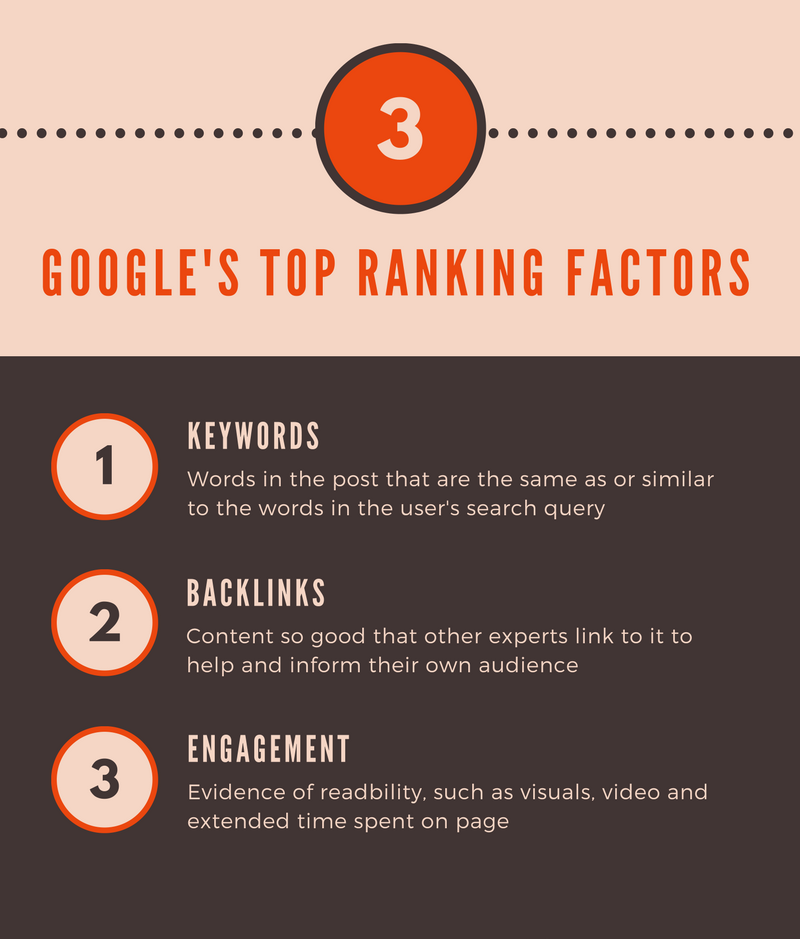An Introduction to Search Engine Optimisation for Small Businesses
Ok Google. Many an internet marketer has studied your ways and spammed out emails claiming to know your secrets. The web is awash with search engine optimisation (SEO) tips and techniques 'guaranteed' to give anyone's ranking a boost.
The thing is, no one except Google really knows how Google decides what should appear on page 1. SEO professionals like me base our decisions on fairly reliable educated guesses, but ultimately we have no proof. Google's algorithms are shrouded in secrecy. And rightly so.
As a small business though, you can make a big difference to your website's search ranking without having to get into the technical details. All you need to do is be clear about what you do and publish regular, relevant content on your website.
How does Google work?
Do you remember the first time you saw Google? I do. I gasped in awe at the bravery — the audacity — of an almost empty page with a search box, a search button, and a cheeky little ‘I'm feeling lucky' button (I never did). It made Altavista and AskJeeves look amateur as it coolly oozed, ‘stick with me, kid. I'll find you what you need.'
It wasn't just a giant leap forward in interface design, Google also produced the most relevant results from day 1. We never went back to Yahoo.
What Google does so incredibly well is work out what you really mean when you type ‘why is the sky blue' or ‘what does the fox say' or ‘plumber in deptford'. In fact, the precise details of how Google works is less important to you as a website owner than its ultimate goal — to provide the most relevant search engine results possible and keep googlers googling.
Your role in the process is to help Google understand who you are and what you provide. Broadly speaking, you do that in two ways:
- Use the most appropriate keywords consistently throughout your website content and page descriptions.
- Regularly update your website with rich, relevant content (usually by blogging).
The importance of keywords
In the early days of search engine optimisation, you found out the most popular keywords, lets say ‘free downloads,' and stuffed your website full of them, regardless of how relevant they were to what your website was for. You might pack the first few lines of every page with keywords, or you could be super sneaky and hide them in the meta descriptions.
Search engines quickly learned they were being gamed with irrelevant keywords, so they upped the ante, learning how to spot keyword stuffing and check for consistent content throughout a website.
Today, words are still the most important way for search engines to associate websites with web searches, but only if they are used naturally and consistently.
How do you select keywords?
The first rule is to be honest and informative. If you're a Deptford-based plumber, ‘Deptford plumber' is a great place to start. You can also have a look at the searches Google suggests, or check your competitors' websites to see how they describe themselves.
To find out how popular specific keywords are, I use Google Adwords. Once registered, choose to set up your first campaign (you won't actually get to the paying stage), then type in your best guess of keyword phrase in the ‘Keywords' box.
Opt for ‘More like this' to get better keyword suggestions. I use the numbers as relative values: If too high, a small business website will struggle to complete with large websites brimming with content. If too low, there's simply no point optimising for the phrase.
Phrases (rather than single words) are more specific and therefore more likely to get matched with searches. For example, a Deptford plumber shouldn't optimise for ‘plumber' alone. Adding a location or a sub-specialisation will make you far more likely to get business from people who only want what you're really good at, or need someone local.
How should you use keywords?
The right keywords fit naturally into your content. Use them in your headings and meta descriptions, and in the first 100 or so words on each page (if relevant). Theme your blog posts around them to give yourself plenty of opportunity to use them in website content.
Make sure they appear in your business description in search results. ‘Barker and Sons | Deptford Plumber' is far more likely to be clicked by someone searching for a plumber than ‘Barker and Sons.'
Tips for local businesses and services
Google is very good at matching searchers with local services. If you're in Deptford and you type ‘local plumber,' a lot of Deptford plumbers appear on page 1. There's a few ways to boost your local credentials:
- Optimise for your location. Google adwords can help you work out how large a location to target. For example, ‘Garforth,' ‘Leeds' or ‘Yorkshire?'
- Add your address to your contact page, even if you don't provide anything to customers from that address.
- Register your business with Google and verify your location. Start at Google My Business.
Regularly update your website with relevant content
Google likes living, breathing websites, regularly updated with relevant content. Why? Because that's what actual real people like. Adding a new blog post once a week is a great way to keep things interesting, demonstrate your expertise, increase the amount of time people spend on your site, and get on Google's good side.
Here are more reasons why you should blog, 10 of my best blogging tips and 5 ways to generate blog ideas.
If you need help defining and integrating keywords into your content, get in touch.











